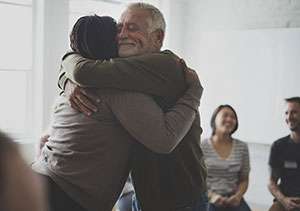
On This Page:
What Is a Support System?
A support system is a network of people that helps you handle the challenges and emotions that come with pancreatic cancer.
Support for the pancreatic cancer patient is critical to improve quality of life and overall well-being. Having a support system of caregivers, family, friends, healthcare professionals and a patient advocate is important to address and manage the needs of the patient.
How Do You Build a Support System?
First, you start building a support system by recognizing the need and taking action. Set up your network to include the following roles, responsibilities and resources and understand how they can help.
Who Is Part of Your Support System?
Caregivers, Family and Friends
Reach out for and accept help from people you know well and trust. Do not be afraid to ask them for help when you need it.
They may:
- Help with daily activities, like running errands, house cleaning and cooking.
- Arrange for transportation or childcare.
- Organize your doctor visits and medical records.
- Speak with healthcare team members on your behalf.
- Research helpful resources and important information.
- Arrange for transportation or child care.
- Find services to help with finances and insurance.
- Keep a schedule of people who want to visit you.
- Provide important emotional support, through caring companionship, love, encouragement and listening.
Often, people in your life want to help but do not know how. Let them know what you want or need.
Keep a list of things you need help with. When someone offers to help, you can pick something from your list. Help isn’t always in the form of an activity. Some days you may just want to talk, and other days you may need help doing something.
You can email your list of needs to your support system and ask people to help where they feel most comfortable. You can even task a caregiver with managing your support system.
Because caregiving is a major responsibility, caregivers also need support systems. The roles and resources on this page can support caregivers just as much as patients.
Healthcare Professionals
You should feel comfortable and supported by your healthcare team. The Pancreatic Cancer Action Network strongly recommends seeking a healthcare team that suits all of your physical, mental and emotional needs.
If you feel you need more support from your healthcare team, don’t be afraid to ask. Tell your doctor or nurse if you want expert help from home health services, psychologists, counselors, dietitians or other specialists.
Some patients and caregivers want help navigating the healthcare system. Ask your healthcare team if they can connect you with a patient navigator, oncology nurse navigator or social worker to help.
PanCAN Patient Services
Get personalized support from the Pancreatic Cancer Action Network’s PanCAN Patient Services. Highly trained and compassionate PanCAN Patient Services Case Managers give patients and their loved ones free resources and information to help them cope with all aspects of a pancreatic cancer diagnosis.
Other Patients and Caregivers
 Connect with others going through similar experiences. This will help you feel:
Connect with others going through similar experiences. This will help you feel:
- Understood, by sharing your thoughts and feelings with people who can relate
- Hopeful and supported, by learning how others handled similar challenges and following their advice
- Connected, by experiencing a sense of community
Find other patients and caregivers by:
- Joining support groups: Support groups allow patients, caregivers and family members to share their experiences, give advice and encourage each other. Contact PanCAN Patient Services for a list of in-person, telephone or online support groups.
- Connecting with the Survivor & Caregiver Network: Talk one-on-one by phone or email with others who have been in similar situations.
- Getting involved in your community: The Pancreatic Cancer Action Network hosts events across the country that bring together survivors, families and researchers affected by the disease.
Civic, Social and Spiritual or Faith-based Groups
Many patients and caregivers find support in civic, social or spiritual or faith-based groups. If these groups were part of your life before the diagnosis, they could be a good source of people willing to help support you. You can also explore these outlets after diagnosis.
Some hospitals offer spiritual or faith-based services. If you are interested, ask your team if these services are available. You can also see if they know of other local organizations that can offer this type of support to cancer patients and caregivers.
We’re Here to Help
Contact PanCAN Patient Services for pancreatic cancer support and resources, including the Survivor & Caregiver Network and a list of support groups.
Related Topics
-
Survivor and Caregiver Network
Connect with someone who has been in your shoes and can offer support and hope.
-
Support Groups
Find opportunities to connect with other survivors and caregivers in group settings.
-
Self-Advocacy
Understand how patients can take an active role in their care.
-
For Caregivers
See resources and information especially helpful for patients’ loved ones.
-
Talking to Your Family
Get tips on how to talk to your family about your diagnosis and other important topics.
Information provided by the Pancreatic Cancer Action Network, Inc. (“PanCAN”) is not a substitute for medical advice, diagnosis, treatment or other health care services. PanCAN may provide information to you about physicians, products, services, clinical trials or treatments related to pancreatic cancer, but PanCAN does not recommend nor endorse any particular health care resource. In addition, please note any personal information you provide to PanCAN’s staff during telephone and/or email communications may be stored and used to help PanCAN achieve its mission of assisting patients with, and finding cures and treatments for, pancreatic cancer. Stored constituent information may be used to inform PanCAN programs and activities. Information also may be provided in aggregate or limited formats to third parties to guide future pancreatic cancer research and education efforts. PanCAN will not provide personal directly identifying information (such as your name or contact information) to such third parties without your prior written consent unless required or permitted by law to do so. For more information on how we may use your information, you can find our privacy policy on our website at https://www.pancan.org/privacy/.





